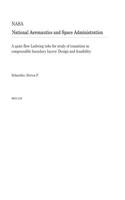
A Quiet Flow Ludwieg Tube for Study of Transition in Compressible Boundary Layers
Series:
Laminar-turbulent transition in high speed boundary layers is a complicated problem which is still poorly understood, partly because of experimental ambiguities caused by operating in noisy wind tunnels. The NASA Langley experience with quiet tunnel design has been used to design a quiet flow tunnel which can be constructed less expensively. Fabrication techniques have been investigated, and invis
NaN
VOLUME
English
Paperback

Laminar-turbulent transition in high speed boundary layers is a complicated problem which is still poorly understood, partly because of experimental ambiguities caused by operating in noisy wind tunnels. The NASA Langley experience with quiet tunnel design has been used to design a quiet flow tunnel which can be constructed less expensively. Fabrication techniques have been investigated, and inviscid, boundary layer, and stability computer codes have been adapted for use in the nozzle design. Construction of such a facility seems feasible, at a reasonable cost. Two facilities have been proposed: a large one, with a quiet flow region large enough to study the end of transition, and a smaller and less expensive one, capable of studying low Reynolds number issues such as receptivity. Funding for either facility remains to be obtained, although key facility elements have been obtained and are being integrated into the existing Purdue supersonic facilities. Schneider, Steven P. Unspecified Center NAG1-1133...
Price Comparison [India]
In This Series
Bestseller Manga
Trending NEWS




















